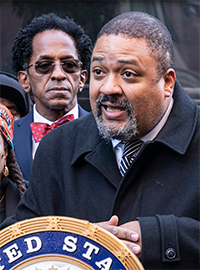| For Prosecutor Bragg, Trump Indictment Is a Campaign Promise Kept |
 |
|
By Byron York
Wednesday, April 05 2023 |
Alvin Bragg, the local district attorney in Manhattan who has led the effort to indict former President Donald Trump, is an elected official. He ran for his current office in 2021. In that campaign, he won a Democratic primary crowded with fellow Democrats who promised that, if elected, they would go after Trump. Now, having been elected, Bragg is going after Trump. Getting Trump has been a common feature in New York elections for law enforcement positions. The 2018 campaign for state attorney general was a virtual bidding war in which each candidate promised to pursue Trump more zealously than the other candidates. The winner, Attorney General Letitia James, has been unable to come up with criminal charges against Trump personally, but she did, along with Bragg, prosecute the Trump Organization on questionable grounds – or, if not questionable, at least grounds that led observers to wonder whether the case would have been pursued with such fervor against an organization not named Trump. Top Trump official Allen Weisselberg pleaded guilty to 15 felony charges. Now Bragg has won the indict-Trump sweepstakes. And for him, indicting Trump on charges that seem truly questionable is more than just indicting Trump. It is keeping a campaign promise. No, Bragg did not specifically pledge, "If elected, I will indict Donald J. Trump." But he promised to pursue Trump and hold him "accountable," which is progressive code for going after Trump in any way possible. In June 2021, Bragg debated his top rival in the district attorney's race, Tali Farhadian Weinstein. Even though there are many, many issues confronting the Manhattan district attorney – issues including rampant violent crime and protecting citizens from rampant violent crime – much of the debate was about Trump. The headline of the New York Times story reporting the debate was "Two Leading Manhattan D.A. Candidates Face the Trump Question." The article began: "Whoever wins the race to become the next Manhattan district attorney will take over one of the most contentious, highest-profile criminal investigations in the office's history: the inquiry into former President Donald J. Trump and his business." Bragg believed he had a special qualification for the job. Again, from the Times: "Mr. Bragg, a former official with the New York attorney general's office, reminds voters frequently that in his former job, he sued Mr. Trump's administration 'more than a hundred times.'" Bragg had an advantage over Farhadian Weinstein. The Times noted that she had once "interviewed with Trump administration officials for a federal judgeship early in his term." That's a problem for a New York Democrat. The paper reported that Farhadian Weinstein was "less vocal" than Bragg about Trump and "only occasionally" reminded audiences that she was involved in a "successful lawsuit against the Trump administration." (It was about the government's treatment of illegal immigrants in New York.) Bragg, on the other hand, loved to talk about his many lawsuits against the Trump administration, President Trump himself and the Trump family. One of those suits was a successful case that led to the dissolution of the Trump Foundation. From the Times: "Mr. Bragg, at a Democratic candidate forum in December, cited that lawsuit as one reason he was qualified to oversee the district attorney's Trump investigation. 'I have investigated Trump and his children and held them accountable for their misconduct with the Trump Foundation,' Mr. Bragg said. 'I know how to follow the facts and hold people in power accountable.'" By "people in power," Bragg meant "Trump." And on Bragg's use of the word "accountable," note that in some progressive circles, the idea of holding Trump "accountable" has taken on the general meaning of punishing Trump for the many bad things progressives believe he has done. It does not have to involve a specific charge or punishment for a specific act – it's the larger issue of holding Trump "accountable" that is important. For one statement of that, look to Washington Post columnist E.J. Dionne, a longtime voice in liberal circles. Last week, Dionne tweeted about a debate among some on the left about what would be the "best" case to prosecute against Trump – the classified documents case, the 2020 election case or Jan. 6. Many Trump opponents have openly wished that one of those cases had been the first prosecution of Trump, and not Bragg's relatively weaker case in New York. Dionne saw a larger principle at work. "My immediate reaction was not to wonder if this was the 'best' case to lead with or what the politics will be," he tweeted on March 30, "but simple relief that Trump was finally being held accountable by the law. He still faces a trial, but that's the point. He has evaded responsibility for too long." In the end, for Bragg and the Democratic officials who have pressed the Trump indictment, and for the supporters who have cheered them on, it's not really about the question of whether Trump committed the misdemeanor offense of falsifying business records and whether that misdemeanor can be properly increased to a felony by alleging some other illegal act. It's about holding Trump "accountable" and thus satisfying many Democrats' pent-up demand for "accountability" for the former president. That's why the Manhattan indictment is more of a campaign promise fulfilled than a legal case. Byron York is chief political correspondent for The Washington Examiner. COPYRIGHT 2023 BYRON YORK |
Related Articles : |
























